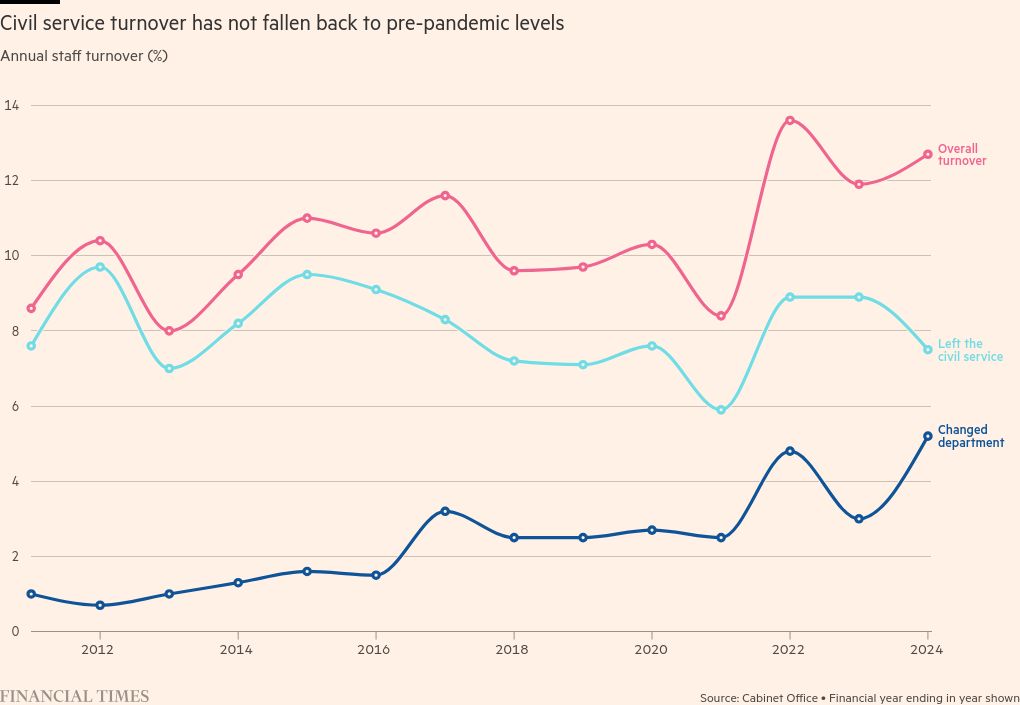
Unlock the Editor’s Digest for free
Roula Khalaf, Editor of the FT, selects her favourite stories in this weekly newsletter.
Civil service turnover has risen over the past year to almost 13 per cent as mandarins changed departments, according to official data, raising concerns that Whitehall lacks sufficient stability to operate effectively.
The share of civil servants who changed departments or left government increased from 11.9 per cent in 2022-23 to 12.7 per cent in 2023-24, data published by the cabinet office on Wednesday showed.
The increased churn was driven by the rate of internal transfers rising from 3 per cent to 5.2 per cent over the past year. The rate of staff leaving the civil service fell from 8.9 per cent to 7.5 per cent.
Turnover has failed to fall back to pre-pandemic levels after peaking at 13.6 per cent in 2021-22, leading analysts to warn that persistently high churn was having an impact on the civil service’s effectiveness.
“This level of turnover prevents the accumulation of expertise and damages institutional memory. It can and should be controlled,” said Jack Worlidge, senior researcher at the Institute for Government think-tank.
Staff surveys show many civil servants change departments seeking promotion or career progression.

Officials have signalled that the new Labour government plans to overhaul the current organisation of Whitehall, breaking down departmental silos to help pursue its key missions.
In a report published on Wednesday, the Institute for Government called on the government to take urgent action to address the structural issues with the civil service.
It outlined 20 immediate reforms that included implementing minimum terms of service for some roles and departmental turnover targets.
Unhappiness about pay is a key driver of civil service high turnover, according to staff surveys. In 2023, better pay and benefits was the most common reason for wanting to leave over the next year, cited by half of staff.
Fran Heathcote, general secretary for the Public and Commercial Services union, said many government departments have faced “staffing crises” in recent years due to “low pay, stressful working conditions and excessive workloads”.
“A contented workforce is a more productive workforce, so if the government is serious about enacting change, it should invest in the civil service, employing more, better-paid staff and treating them with the respect they deserve,” she added.
The median pay for civil servants increased 6.5 per cent during the last financial year, the largest rise in a decade, official data showed, although average pay still remains lower than 2010 in real terms.
The number of senior civil servants earning above £200,000 jumped from 20 to 30. There was also a 50 per cent increase in officials earning between £150,000 to £200,000, to 260 staff. The number earning between £100,000 to £150,000 rose 40 per cent to 2,625 people.
The data did not reveal the roles in which the highest-paid civil servants were employed.
“If that’s the civil service bringing in much more expertise in areas which it has to pay for, such as digital and AI, then we’d be very supportive, because it reduces our reliance on more expensive private sector expertise,” said Patrick King, senior researcher at the Reform think-tank.
Cabinet office guidance published this week outlined that departments can make average pay awards up to 5 per cent in 2024-25.
The erosion of real pay has led to the creation of a rising number of senior roles, as departments promote staff in a bid to retain them. The latest data showed only 26 per cent of staff were in the most junior roles, administrative assistant and officers, down from 41 per cent a decade ago.
Total employment has also continued to grow for the eighth consecutive year, despite efforts by Conservative governments to cut headcount, reaching 543,000 in 2023-24.
Earlier this week the government said it would drop headcount caps, stating that efficiencies would be found through “reducing use of consultants and making sure back-office functions are as streamlined as possible”.
Labour has committed to halving spending on consultants over the next five years, after spending on external expertise reached record levels during the last parliament.
A Cabinet office spokesperson said the government would “develop a strategic plan for a more efficient and effective civil service, including bold measures to improve skills, harness digital technology and improve public services.”

